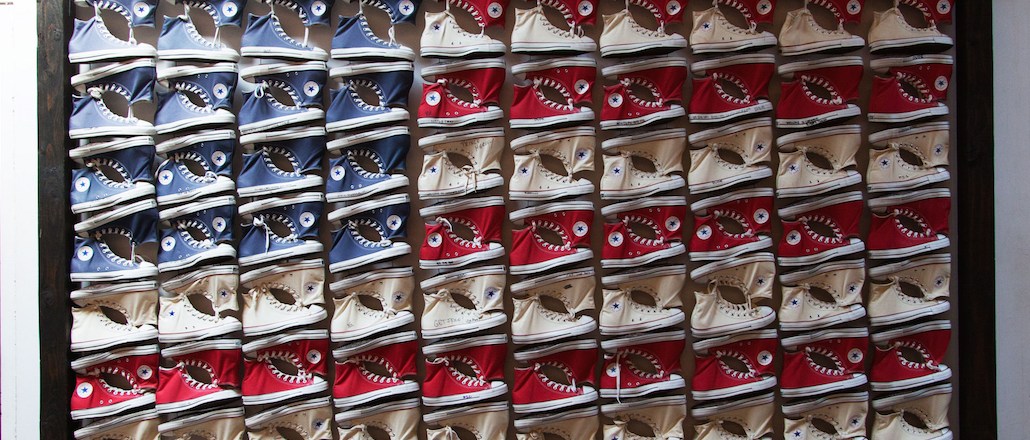
Converse Rubber Tracks, a collection of both permanent and pop-up recording studios owned by the sneaker brand, is the company’s musical outlet. It’s also a key part of Converse’s content strategy.
Converse is a $2 billion Nike-owned company that owns and operates three music studios in Brooklyn, Boston and Brazil year-round. The studios offer budding bands and musicians free eight-hour studio sessions, time with a sound engineer, access to equipment and rights to recorded songs.
“Converse owes so much to music,” said Jed Lewis, global director of music marketing at Converse. “Artists big and small have historically gravitated toward Converse, regardless of decade or genre, and that made this brand a cultural icon.”
Its Chuck Taylor, which, before concert stages, appeared on basketball courts in the 1970s, is one of the most instantly recognizable sneakers in the market. (Kurt Cobain notably wore Converse during the Nirvana days.) But in 2002, the brand was in jeopardy: with a net worth of just over $200 million, Converse was on the verge of bankruptcy before being purchased by Nike.
Since then, the brand has become a fast seller, its revenue growing 14 percent in its fiscal year ended May 31, 2014, and 21 percent in FY 2015, to $2 billion, per Nike.
In 2011, with financial security restored, Converse launched Rubber Tracks as a standalone Williamsburg recording studio with the mission of boosting young artists’ careers. Lewis said the brand’s interests lie in investing in the industry’s future — as in, its unsigned artists.

Since, two more Rubber Tracks studios have opened — most recently in July at the company’s new global headquarters in Boston, as well as Brazil. There are pop-up studios in 25 cities, including Austin and Amsterdam. To date, 1,400 musical acts have spent a combined total of 11,200 hours recording with Converse.
“Brands and musicians teaming up is a common alliance as a marketing strategy,” said Stephanie Kellar, a professor in Berklee College Of Music’s music business and management department. “Converse has taken it in an interesting direction by bringing in young emerging artists to record, and then letting them retain ownership [of their songs]. It’s an advantageous way to support musicians.”
To work with Converse, musicians apply online for a studio slot and, if accepted, are recording in a month or so. Rubber Tracks Brooklyn’s assistant manager Ben Julia said he’s looking for bands that will value the studio time, which could normally cost a band thousands of dollars. The team also takes a band’s social media activity and followers into account.

Bands that record at Rubber Tracks sign a contract with Converse stating that they own all the rights to their own music, with a few contingencies: With the band’s permission, Converse can share the music recorded in their studios on social media and their online streaming site SoundCloud page, which has 11,000 subscribers.
Converse can use Rubber Tracks-recorded songs as its own digital content, with artists’ permission.
“Rubber Tracks is a key generator of content for Converse,” said Lewis. “Content is obviously really important, because we want to talk to our consumer not only about our products but also about our mission. So that’s our main avenue to talk about music, and some great content has come out of it.”
From the songs recorded by Rubber Tracks alumni, Converse was also able to build out a free 21,000-track sample library for any artist to use. Lewis said the library was built out and launched earlier this year as a way to contribute to musicians like rappers and DJs, since sampling music legally can get expensive.
Converse also runs a music-focused Tumblr, featuring artist interviews, tracks and announcements, a lot of which regard Rubber Tracks Live, free Converse-hosted concerts with Rubber Tracks artists performing as headliners’ openers.

Berklee’s Kellar said that while she supports what Converse is doing for young artists, a brand’s sole purpose is to sell product. With that in mind, she’s not surprised that Converse hasn’t done more to push the envelope of the music industry, which is mostly men.
“I’d like to see them push it a little bit,” said Kellar. “Not to say they ignore female artists, but they could improve there. They could do more to be more diverse.”
The company didn’t break out how many of its Rubber Tracks artists were female. But in Converse’s terms, Rubber Tracks is trying to expand globally. This fall, the brand will send 84 artists, narrowed down from 9,000 applicants, to 12 recording studios around the world, including Rubber Tracks in Brooklyn and Abbey Road in London, for sessions.
With the help of partners like Guitar Center, which provides the musical equipment for Rubber Tracks Brooklyn, Converse plans to continue growing its music business.
“We’re so engaged in the idea of giving something back to the music industry in a way that’s consistent, and it’s resonated,” said Lewis. “It’s been unbelievably rewarding so far.”
All images via Hannah Yi.
More in Marketing

Star power, AI jabs and Free Bird: Digiday’s guide to what was in and out at the Super Bowl
This year’s Big Game saw established brands lean heavily on star power, patriotic iconography and the occasional needle drop.

In Q1, marketers pivot to spending backed by AI and measurement
Q1 budget shifts reflect marketers’ growing focus on data, AI, measurement and where branding actually pays off.

GLP-1 draws pharma advertisers to double down on the Super Bowl
Could this be the last year Novo Nordisk, Boehringer Ingelheim, Hims & Hers, Novartis, Ro, and Lilly all run spots during the Big Game?





